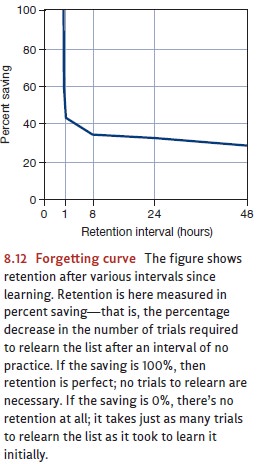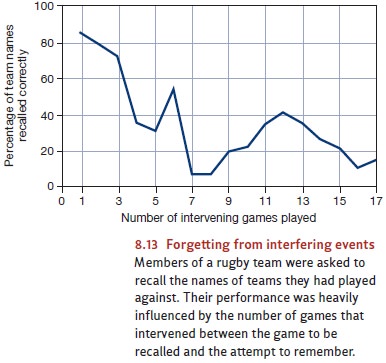Chapter: Psychology: Memory
Memory Gaps, Memory Errors: Forgetting
Forgetting
There are many reasons why we
sometimes cannot recall past events. In many cases, as we’ve noted, the problem
arises because we didn’t learn the relevant information in the first place! In
other cases, though, we learn something—a friend’s name, the lyrics to a song,
the content of the Intro Bio course—and can remember the information for a
while; but then, sometime later, we’re unable to recall the information we once
knew. What produces this pattern?
One clue comes from the fact that
it’s almost always easier to recall recent events (e.g., yesterday’s lecture or
this morning’s breakfast) than it is to recall more distant events (a lecture
or a breakfast 6 months ago). In technical terms, recall decreases, and
forgetting increases, as the retention
interval (the time that elapses between learning and retrieval) grows
longer and longer.
This simple fact has been
documented in many studies; indeed, the passage of time seems to work against
our memory for things as diverse as past hospital stays, our eating or smoking
habits in past years, car accidents we experienced, our con-sumer purchases,
and so on (Jobe, Tourangeau, & Smith, 1993). The classic demon-stration of
this pattern, though, was offered more than a century ago by Hermann Ebbinghaus
(1850–1909). Ebbinghaus systematically studied his own memory in a series of
careful experiments, examining his ability to retain lists of nonsense sylla-bles,
such as zup and rif. (Ebbinghaus relied on these odd stimuli as a way of making
sure he came to the memory materials with no prior associations or links; that
way, he could study how learning proceeded when there was no chance of
influence from prior knowledge.) Ebbinghaus plotted a forgetting curve by testing himself at vari-ous intervals after
learning (using different lists for each interval). As expected, he found that
memory did decline with the passage of time. However, the decline was uneven;
it was sharpest soon after the learning and then became more gradual
(Ebbinghaus, 1885; Figure 8.12).

There are two broad ways to think
about the effect of retention interval. One per-spective emphasizes the passage
of time itself—based on the idea that memories decay as time passes, perhaps because normal metabolic processes
wear down the memory traces until they fade and finally disintegrate. A
different perspective suggests that time itself isn’t the culprit. What matters
instead is new learning—based on the
idea that new information getting added to long-term memory somehow disrupts
the old informa-tion that was already in storage. We’ll need to sort through
why this disruption might happen; but notice that this perspective, too,
predicts that longer retention intervals will lead to more forgetting—because
longer intervals provide more opportunity for new learning and thus more
disruption from the new learning.
Which perspective is correct? Is
forgetting ultimately a product of the passage of time, or a product of new
learning? The answer is both. The
passage of time, by itself, does seem to erode memories (e.g., E. Altmann &
Gray, 2002; C. Bailey & Chen, 1989; Wixted, 2004); but the effect of new
learning seems larger. For example, Baddeley and Hitch (1977) asked rugby
players to recall the names of the other teams they had played against over the
course of a season; the researchers then systematically compared the effect of timewith the effects of new learning. To examine the effects of
time, Baddeley and Hitch capitalized on the fact that not all players made it
to all games (because of illness, injuries, or schedule conflicts). These
differences allowed them
to compare players
for whom “two games back” means 2 weeks ago, to players for whom “two
games back” means 4 weeks ago. Thus, they were able to look at the effects of
time (2 weeks vs. 4) with the number of more recent games held constant.
Likewise, to examine the effects of new learning, these researchers compared
(say) players for whom the game a month ago was “three games back” to players
for whom a month ago means “one game back.” Now we have the retention interval
held constant, and we can look at the effects of intervening events. In this
setting, Baddeley and Hitch report that the mere passage of time accounts for
very little; what really matters is the number of inter-vening events—just as
we’d expect if intervening learning, and not decay, is the major con-tributor
to forgetting (Figure 8.13). (For other—classic—data on this issue, see Jenkins
& Dallenbach, 1924; for a more recent review, see Wixted, 2004.)

An effect of new learning undoing
old learning can also be demonstrated in the lab-oratory. In a typical study, a
control group learns the items on a list (A) and then is tested after a
specified interval. The experimental group learns the same list (A), but they
must also learn the items on a second list (B) during the same retention
interval. The result is a marked inferiority in the performance of the
experimental group. List B seems to interfere with the recall of list A
(Crowder, 1976; McGeoch & Irion, 1952).
Of course, not all new learning produces this disruption. No interference is observed, for example, between dissimilar sorts of material—and so learning to skate doesn’t undo your memory for irregular French verbs. In addition, if the new learning is consistent with the old, then it certainly doesn’t cause disruption; instead, the new learning actually helps memory. Thus, learning more algebra helps you remember the algebra you mastered last year; learning more psychology helps you remember the psy-chology you’ve already covered.
Related Topics